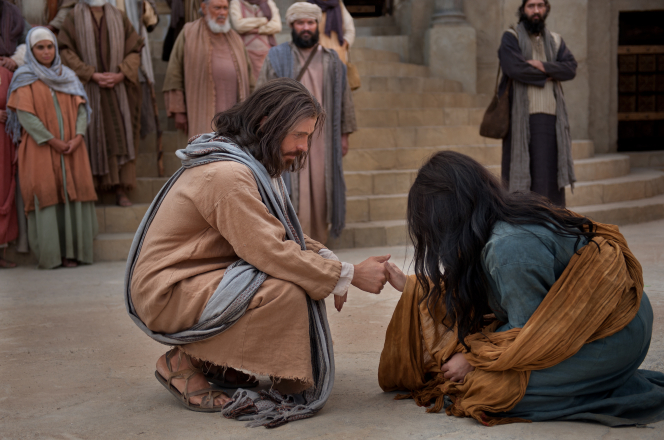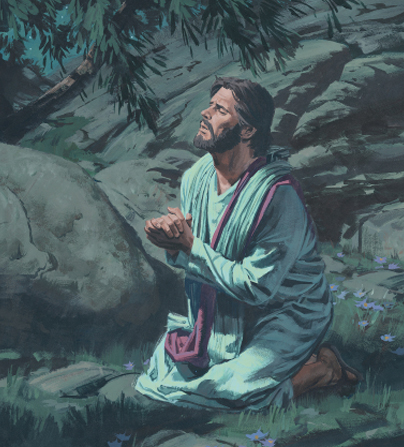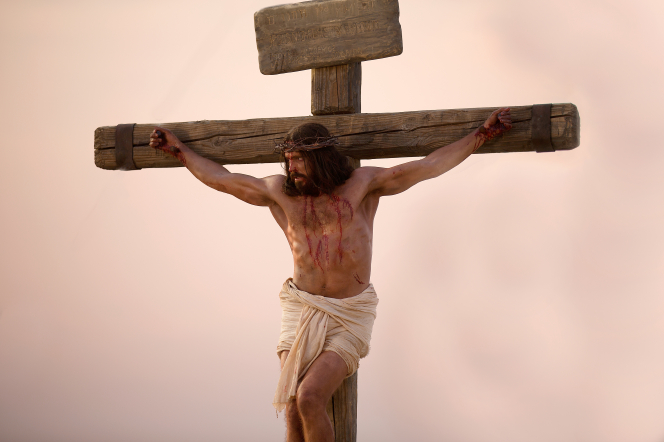by: Norberto Betita
 As we commemorate the Easter season we might wonder why Jesus Christ who declared himself to the Samaritan woman as the source of “living water" (See John 4:10), should at the moment of His agony declare, “I thirst” (see John 19:28).
As we commemorate the Easter season we might wonder why Jesus Christ who declared himself to the Samaritan woman as the source of “living water" (See John 4:10), should at the moment of His agony declare, “I thirst” (see John 19:28).
Jesus and His disciples traveled from Judea to Galilee and to Samaria. While His disciples went to the city to buy meat He sat on Jacob’s well where a woman of Samaria came to draw water. Jesus then asked the woman to give Him drink. The woman was surprised because the Jews had no dealings with the Samaritans. Jesus told the woman that if she only knew who He was she would have asked Him and He should have given her living water (see John 4:3-10). Explaining about the difference between the water that is in Jacob’s well and His promised living water, He told the Samaritan woman, “Whosoever drinketh of this water shall thirst again: But whosoever drinketh of the water that I shall give him shall never thirst; but the water that I shall give him shall be in him a well of water springing up into everlasting life” (see John 4:13-14). To which, “The woman saith unto him, Sir, give me this water, that I thirst not” (see John 4:15).
To Nephi the Spirit of God showed in vision, “the fountain of living waters, … which waters are a representation of the love of God” (see 1 Nephi 11:25). To every man and woman He extends His invitation: “Everyone that thirsteth, come ye to the waters” (see Isaiah 55:1 and 2nd Nephi 9:50). During His mortal ministry, “Jesus stood and cried, saying, If any man thirst, let him come unto me, and drink. He that believeth on me, as the scripture hath said, out of his belly shall flow rivers of living water” (see John 7:37-38). He has ever wanted us to partake of the living water---the love of God---freely that we may thirst not and that, “Therefore with joy shall [we] draw water out of the wells of salvation” (Isaiah 12:3). Such was His unchangeable promise, His undeniable assurance.
To Nephi the Spirit of God showed in vision, “the fountain of living waters, … which waters are a representation of the love of God” (see 1 Nephi 11:25). To every man and woman He extends His invitation: “Everyone that thirsteth, come ye to the waters” (see Isaiah 55:1 and 2nd Nephi 9:50). During His mortal ministry, “Jesus stood and cried, saying, If any man thirst, let him come unto me, and drink. He that believeth on me, as the scripture hath said, out of his belly shall flow rivers of living water” (see John 7:37-38). He has ever wanted us to partake of the living water---the love of God---freely that we may thirst not and that, “Therefore with joy shall [we] draw water out of the wells of salvation” (Isaiah 12:3). Such was His unchangeable promise, His undeniable assurance.
 He allowed the people both Jew and Gentile to witness how such living water or the infinite love of God works. He feed the hungry; he clothed the naked; he healed the sick and the afflicted; he gave sight to the blind; he gave comfort to the weary and worn; he liberated the captives; he forgave the sinners. He did these miraculous acts as expressions of His unfailing love. Yet not many appreciated Him. Those whom He offered His unspeakable love instead wanted Him crucified. They ridiculed Him and led Him to suffer more than He could bear. But He was ever as willing to bear all the burdens of the guilt of humankind upon His shoulders according to His infinite promise that they will eventually have the fountain of living water where all may draw from the “wells of salvation”.
He allowed the people both Jew and Gentile to witness how such living water or the infinite love of God works. He feed the hungry; he clothed the naked; he healed the sick and the afflicted; he gave sight to the blind; he gave comfort to the weary and worn; he liberated the captives; he forgave the sinners. He did these miraculous acts as expressions of His unfailing love. Yet not many appreciated Him. Those whom He offered His unspeakable love instead wanted Him crucified. They ridiculed Him and led Him to suffer more than He could bear. But He was ever as willing to bear all the burdens of the guilt of humankind upon His shoulders according to His infinite promise that they will eventually have the fountain of living water where all may draw from the “wells of salvation”.  That all may thirst no more unto everlasting life He wanted to provide everybody of His living water. This He intended to do that all men might live in accord with the eternal plan of Heavenly Father of which He was the appointed Savior. He suffered that we may not suffer and that all of us might taste of the glory He has promised. And in doing all the needed sacrifices prior to His being nailed on the cross and after giving up all of His living water---His infinite love to billions and billions of all who sinned, at the last moment of His agony on the cross at Calvary, exhausted and totally drained after trading His innocence in favor of the sinful humanity that all might not drink the bitter cup which He voluntarily drunk, that His saving mission might be fulfilled, “Jesus knowing that all things were now accomplished”, and perhaps knowing that everybody both bond or free; sinners and saints; can now have the privilege to draw and partake from the well of living water finally declared, “I thirst” (see John 19:28).
That all may thirst no more unto everlasting life He wanted to provide everybody of His living water. This He intended to do that all men might live in accord with the eternal plan of Heavenly Father of which He was the appointed Savior. He suffered that we may not suffer and that all of us might taste of the glory He has promised. And in doing all the needed sacrifices prior to His being nailed on the cross and after giving up all of His living water---His infinite love to billions and billions of all who sinned, at the last moment of His agony on the cross at Calvary, exhausted and totally drained after trading His innocence in favor of the sinful humanity that all might not drink the bitter cup which He voluntarily drunk, that His saving mission might be fulfilled, “Jesus knowing that all things were now accomplished”, and perhaps knowing that everybody both bond or free; sinners and saints; can now have the privilege to draw and partake from the well of living water finally declared, “I thirst” (see John 19:28).The thirst which Jesus experienced must have been felt from the very moment that He bled at every pore at the garden of Gethsemane and painfully suffered all the tortures and anguishes in behalf of our guilt. Yet He bore it patiently until the final hours of His atonement was concluded on the cross and only after He knew that His mission was accomplished. President Joseph Fielding Smith explained: “The driving of the nails into his hands and into the Savior’s feet was the least part of his suffering. We get into the habit, I think, of feeling, or thinking that his great suffering was being nailed to the cross and left to hang there. Well, that was a period in the world’s history when thousands of men suffered that way. So his suffering, so far as that is concerned, was not any more than the suffering of other men who have been so crucified. What, then, was his great suffering? I wish we could impress this fact upon the minds of every member of this Church: His great suffering occurred before he ever went to the cross. It was in the Garden of Gethsemane, so the scriptures tell us, that blood oozed from every pore of his body; and in the extreme agony of his soul, he cried to his Father. It was not the nails driven into his hands and feet. Now do not ask me how that was done because I do not know. Nobody knows. All we know is that in some way he took upon himself that extreme penalty. He took upon him our transgressions, and paid a price, a price of torment.” (Teachings of Presidents of the Church: Joseph Fielding Smith, (2013), 58–71).
 He thirsted that according to the prophecies of Isaiah on the day of restoration, “the lame man leap as an hart, and the tongue of the dumb sing: for in the wilderness shall waters break out, and streams in the desert. And the parched ground shall become a pool, and the thirsty land springs of water: And the ransomed of the Lord shall return, and come to Zion with songs and everlasting joy upon their heads: they shall obtain joy and gladness, and sorrow and sighing shall flee away” (Isaiah 35:6-7, 10). The love of the Almighty will be poured out without measure to everyone that received Him. The thirst that Jesus suffered while on the cross at Calvary provided us with substantive assurance that we will not suffer if only we should live up to the principles of His everlasting gospel.
He thirsted that according to the prophecies of Isaiah on the day of restoration, “the lame man leap as an hart, and the tongue of the dumb sing: for in the wilderness shall waters break out, and streams in the desert. And the parched ground shall become a pool, and the thirsty land springs of water: And the ransomed of the Lord shall return, and come to Zion with songs and everlasting joy upon their heads: they shall obtain joy and gladness, and sorrow and sighing shall flee away” (Isaiah 35:6-7, 10). The love of the Almighty will be poured out without measure to everyone that received Him. The thirst that Jesus suffered while on the cross at Calvary provided us with substantive assurance that we will not suffer if only we should live up to the principles of His everlasting gospel. If, however, like Alma the younger, who with the sons of Mosiah rebelled against God and seek to destroy His church then the thirst which the Lord suffered will find no efficacy to satisfy our yearnings for His redeeming love. Instead we will be “racked with torment” and “harrowed up by the memory of [our] sins”. We will be brought into the “gall of bitterness and [be] encircled about by the everlasting chains of death” (see Alma 36:17-18). Yet His thirst is to help us that we might be relieved from the pains of our sinfulness and abominations. Whether we are rich of poor, bond or free, we can all partake of the love of God freely if only we would repent and come to Him and “awake and arouse [our] faculties, even to an experiment upon [His] words, and exercise a particle of faith,” and “desire to believe,” and give place for a portion of [His] words” (see Alma 32:27) in our lives.
As He tried to quench our thirst for the love of God, He then leads us, “unto living fountains of waters” where “God shall wipe away all tears from [our] eyes.” (see Rev. 7: 17). And again to his beloved Apostle he said: “It is done. I am Alpha and Omega, the beginning and the end. I will give unto him that is athirst of the fountain of the water of life freely” (see Rev. 21: 6). And because He thirsted, “in the barren deserts” of our hearts “there shall come forth pools of living water”---His infinite love; “and the parched ground” of our souls “shall no longer be thirsty” (see Doctrine & Covenants 133:29).
 What a wonderful feeling I do have that He thirsted that I might have eternal life; that He sacrificed, for me to be able to inherit the glory that has been reserved for the faithful of Heavenly Father’s children. He thirsted and conclusively declared “it is finished” as He finally “gave up the ghost” (see John 19: 30) to complete His saving mission for me and the rest of humankind. He voluntarily gave His life as a ransom for my sins. Nobody took it from Him, He laid it down Himself. He had the power to lay it down and He had the power to take it again (see John 10:17-18). To me His words “I thirst” speak of the eventual triumph and victory of His atonement that I and the rest of humanity might thirst no more. It helped me to understand that never in anyway should I need to thirst for the love of God for Jesus the crucified have borne all my griefs, my sorrows, and my sinfulness in exchange of my cravings for God’s consuming love and mercy, on conditions of repentance. I felt honored by the fact that for as long as my deeds and desires are centered on Him, and should my heart be continually filled to overflowing with aspirations to serve God and His church, then I can have the unmistakable assurance that He will let His living water freely flow to fill the voids of my personal and spiritual well where I may draw the promise of eternal life.
What a wonderful feeling I do have that He thirsted that I might have eternal life; that He sacrificed, for me to be able to inherit the glory that has been reserved for the faithful of Heavenly Father’s children. He thirsted and conclusively declared “it is finished” as He finally “gave up the ghost” (see John 19: 30) to complete His saving mission for me and the rest of humankind. He voluntarily gave His life as a ransom for my sins. Nobody took it from Him, He laid it down Himself. He had the power to lay it down and He had the power to take it again (see John 10:17-18). To me His words “I thirst” speak of the eventual triumph and victory of His atonement that I and the rest of humanity might thirst no more. It helped me to understand that never in anyway should I need to thirst for the love of God for Jesus the crucified have borne all my griefs, my sorrows, and my sinfulness in exchange of my cravings for God’s consuming love and mercy, on conditions of repentance. I felt honored by the fact that for as long as my deeds and desires are centered on Him, and should my heart be continually filled to overflowing with aspirations to serve God and His church, then I can have the unmistakable assurance that He will let His living water freely flow to fill the voids of my personal and spiritual well where I may draw the promise of eternal life.
On the third day after His crucifixion He was resurrected that all might be glorified. On the remaining few moments of His mortal life, He thirsted, but now He thirsted no more for His glory had come and He now sits in His rightful place in Heavenly Father’s Kingdom. The prophet Joseph Smith testified: “And now, after the many testimonies which have been given of him, this is the testimony, last of all, which we give of him: That he lives! For we saw him, even on the right hand of God; and we heard the voice bearing record that he is the Only Begotten of the Father— That by him, and through him, and of him, the worlds are and were created, and the inhabitants thereof are begotten sons and daughters unto God. (Doctrine & Covenants 72:22-24).
He thirsted, “For it is expedient that an atonement should be made; for according to the great plan of the Eternal God there must be an atonement made, or else all mankind must unavoidably perish; … yea, all are fallen and are lost, and must perish except it be through the atonement” (Alma 34:9).
Like the woman of Samaria it is imperative upon each of us to believe and accept the Lord’s offer to partake of the “water springing up into everlasting life” (see John 4:13-14) that we may be filled of His redeeming love and mercy. Then we need to come to our best understanding of His atoning sacrifice and find real meaning on one of His last phrases spoken while hanging on the cross at Calvary’s hill where while in ultimate anguish and suffering declared, “I thirst”.
Like the woman of Samaria it is imperative upon each of us to believe and accept the Lord’s offer to partake of the “water springing up into everlasting life” (see John 4:13-14) that we may be filled of His redeeming love and mercy. Then we need to come to our best understanding of His atoning sacrifice and find real meaning on one of His last phrases spoken while hanging on the cross at Calvary’s hill where while in ultimate anguish and suffering declared, “I thirst”.